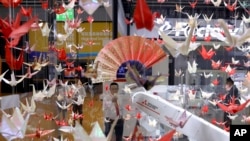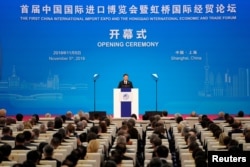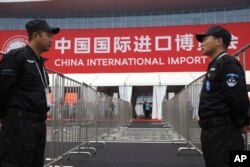Chinese President Xi Jinping spoke in Shanghai Monday to open the China International Import Expo.
Xi spoke to about 3,000 business and government representatives who gathered for the event. Many expected Xi to announce reforms for trade and investment. But that did not happen.
Carlo Diego D'Andrea is vice president and Shanghai Chapter chairman of the European Chamber of Commerce in China.
He told VOA, "We were waiting today for President Xi to inform the world about the reform that will take place in the coming days, but what we wanted to hear, (such as) the complete steps on implementing the reform and a clear timetable, did not appear."
Xi said China would ease barriers to industries such as financial services, agriculture, mining and education. He said the nation would increase purchasing of imported goods and lower tariffs. He also said China would create a better business environment with a reasonable system of rules, including punishing intellectual property rights violators.
Xi admitted China could work to better protect intellectual property rights. But he also said those who are not pleased with China’s behavior should look at their own treatment of such rights, as well.
Some of Xi’s comments appeared to be directed toward the United States and its leader, President Donald Trump.
Xi promised that China would import as much as $30 trillion in goods and $10 trillion in services during the next 15 years. Last year, China imported $1.8 trillion in goods and $458 billion in services.
Thousands of foreign companies are taking part in the expo. Some countries, like Kenya, even have national exhibitions at the event in an effort to win interest in their products and improve ties. Kenyan President Uhuru Kenyatta was one of several leaders who, in addition to Xi, spoke at the opening ceremony Monday.
Kenyatta noted how China is his nation's biggest trading partner. In fact, trade between the two countries grew from $471 million in 2007 to $4 billion in 2017.
Kenyatta said, "This trade, however, was skewed heavily in favor of China…It is important therefore to correct the trade imbalance and enable a fairer share of trade."
Xi praised Shanghai as a center for technology and invention. China wants Shanghai to be one of the world's leading international financial centers by 2020.
China remains one of the world's most protectionist economies. The Organization for Economic Cooperation and Development ranks China 59 out of 62 countries in terms of openness for foreign direct investment.
D'Andrea said the expo will help countries reduce their trade deficits with China. But, he added, it will not change China’s reform deficit.
VOA News reported this story. Caty Weaver adapted it for VOA Learning English. Ashley Thompson was the editor.
Write to us in the Comments Section or on our Facebook page. __________________________________________________________________
Words in This Story
implement -v. to begin to do or use (something, such as a plan) : to make (something) active or effective
tariff -n. a tax on goods coming into or leaving a country
skew -v. to change (something) so that it is not true or accurate
rank -n. to place (someone or something) in a particular position among a group of people or things that are being judged according to quality, ability, size, etc.







